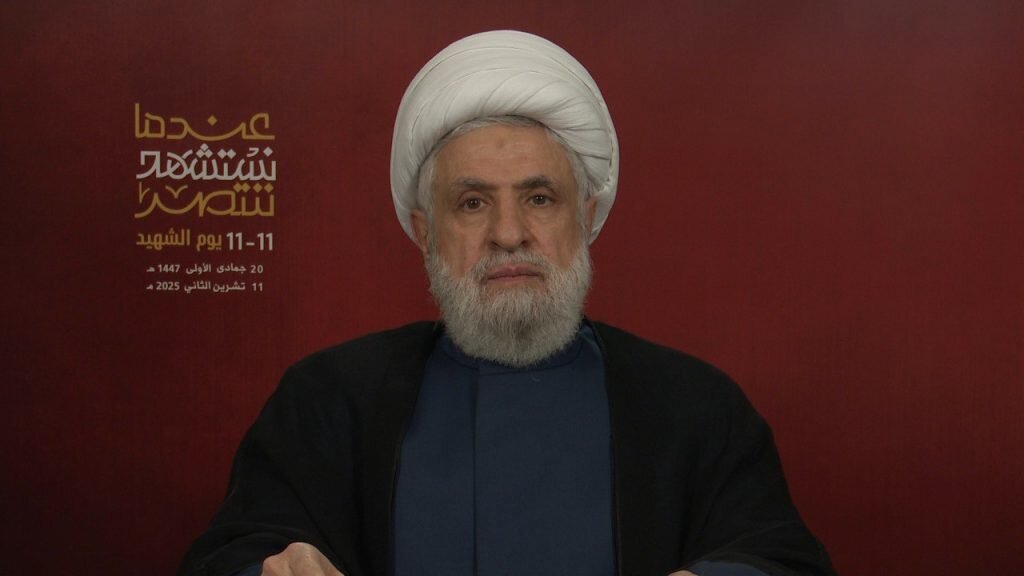Qassem on Martyrs’ Day: Resistance’s strength lies in “faith and will”

TEHRAN - Martyrs’ Day within the Resistance community has grown into more than an occasion of remembrance; it stands as a reaffirmation of faith and defiance — a living testament that martyrdom extends life and that sacrifice remains the foundation of dignity and national defense.
Since the 1982 invasion, when the Israeli enemy entered Lebanon under the pretext of “security north of occupied Palestine,” the culture of martyrdom has evolved into a collective weapon of honor, born amid aggression, abandonment, and international complicity.
Marking the occasion, Hezbollah Secretary-General Sheikh Naim Qassem delivered a major address tracing the arc of four decades of confrontation. He revisited the historical struggle, assessed the latest agreement with the Israeli enemy, and outlined the Resistance’s enduring role in defending Lebanon’s sovereignty. Qassem warned that the United States and its Israeli ally are pursuing a project to reshape Lebanon to serve their strategic interests.
Four decades of defiance
The Resistance leader recalled that what began in 1982 as a so-called “security operation” was, in fact, an occupation plan aimed at permanent settlement in southern Lebanon. “Their goal was never to stop rockets but to occupy, expand, and entrench,” he asserted.
He recounted that from that realization, the Resistance emerged as both a national and spiritual response to occupation — a movement that endured until the Israeli enemy’s humiliating withdrawal in 2000 “under the weight of the Resistance’s blows, without conditions.”
Qassem emphasized that liberation did not mark an end but a transition: deterrence became the central pillar of protection. He maintained that the “army, people, and Resistance” formula remains Lebanon’s true defense structure, asserting that “since 2000, deterrence has been preserved through faith, will, and national unity.”
The Hezbollah chief highlighted that the Resistance’s power lies not in arms alone but in consciousness — a will to resist domination regardless of external pressure. “They failed to tame Lebanon because our people refuse subjugation,” he remarked.
Ongoing assault, no word from the government
Discussing the November 27, 2024 agreement, which called for a ceasefire and a withdrawal of the Israeli enemy south of the Litani River, Qassem argued that the deal remains unfulfilled due to Israeli evasion and U.S. sponsorship. “Israel’s retreat would mean the restoration of Lebanon’s sovereignty and dignity — that is what they seek to prevent,” he noted.
He accused Washington of pursuing indirect tutelage over Lebanon by seeking to arm the Lebanese Army in a way that positions it against the Resistance rather than the enemy. “They want to neutralize Lebanon’s defensive capacity and turn the country into a backyard for Greater Israel,” he warned.
The Hezbollah chief condemned the government’s silence in the face of continuous aggression, pointing out that since the agreement, “303 martyrs have fallen, 917 wounded, and thousands of violations have been recorded.” He cited UNIFIL statements confirming no Resistance activity in the operational zone, a proof that Israel’s security claims are baseless.
He further criticized local political rhetoric that keeps invoking “exclusive arms,” asserting that “the issue is no longer weapons but the very existence of the Resistance and its community.”
Qassem accused the United States of waging a comprehensive political and economic war designed to weaken both Lebanon and the Resistance. “This is not a border dispute,” he said. “It is a project of occupation and control, executed through the U.S.–Israeli axis.”
He urged the government to assume its constitutional duty: to protect citizens, rebuild what has been destroyed, and reject all foreign dictates. “The government’s role is not to heed American orders but to restore sovereignty,” he stressed.
The Hezbollah chief reaffirmed five core principles guiding the movement:
1. The agreement applies only south of the Litani; the enemy must withdraw fully and release prisoners, while the state enforces the deal by all legitimate means.
2. The South is a national responsibility; its pain affects every Lebanese.
3. No new accord will replace or absolve the enemy.
4. The aggression will not continue indefinitely — “everything has its limit.”
5. The Resistance community is Lebanon’s safety valve, not a burden, blocking political, security, and economic infiltration.
Reaffirming Resistance and deterrence
Concluding his address, Sheikh Qassem reaffirmed that the Resistance’s strength lies in “faith and will,” not in numbers or weapons. “It is faith that turns a rifle into a quake in the enemy’s heart,” he said.
His message was more a declaration of direction than a commemoration — a reminder that the Resistance endures, that Lebanon’s sovereignty is non-negotiable, and that any attempt to redraw Lebanon’s identity or weaken its defense will be met with steadfast Resistance on every front.
Qassem underscored that the coming phase requires maintaining deterrence without sliding into full-scale war, as Washington intensifies efforts to isolate Hezbollah from the regional Axis of Resistance through “neutralization” projects and financial strangulation.
At its core, his speech articulated a comprehensive vision: Lebanon’s security cannot be traded for the Israeli enemy’s safety. The only formula that protects the nation, Qassem affirmed, is deterrence — grounded in martyrs, faith, and a will that does not surrender.
Leave a Comment